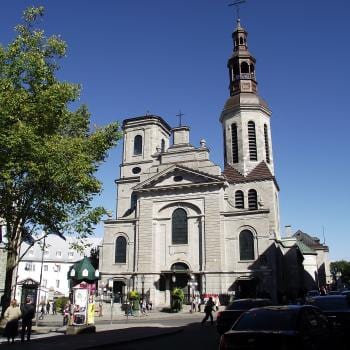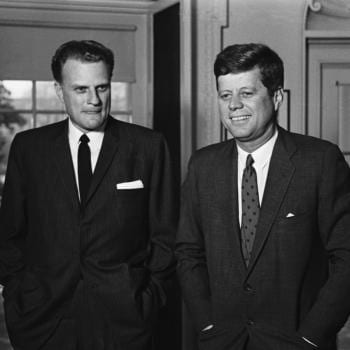This was one of the first times I’ve seen a recognition that Protestants are indeed Christian:
If you have left the Catholic Church, but you still call yourself a Christian, please be considerate when you make comments about what's going on in the Catholic Church these days. It's not simply a club or a political party or a camarilla you are no longer a member of.
— Massimo Faggioli (@MassimoFaggioli) August 24, 2018
But even as some acknowledge Protestantism may be Christian comes a distinction between the Church and Jesus Christ:
Why do we have the word “Catholic” in our name, and not the word “Christ”? . . .
The answer to this question actually marks a significant difference between Catholics and Protestants, who more frequently mention “the Lord Jesus”. Never mind for the moment that Protestants can hardly refer to “the Church”, since they do not have a “church”. While all Protestants are baptized Catholic, as Protestants they have no apostolicity, no succession in grace and orders, and no Christic unity of governance. The Orthodox can properly refer to themselves as “a church”; Protestant bodies are churches only in a more conventional sense. But such “churches” are not really churches, but sects or gatherings or communities or fellowships.
We might almost call them “prayer groups”. But there is a deeper issue.
Even if this smacks of a kind of religious elitism — Protestants as low-brow Christians — it is at least a welcome moment of truth. I have long thought that Roman Catholics sort of looked down on Protestants for being tacky, economically driven, not liturgical or sacramental, not having beauty. Even in the days of Evangelicals and Catholics Together, my sense was that the Roman Catholics behind this did not look at Protestants as partners in Christianity as much as allies in the culture wars.
But I find it hard to believe that if forced to choose between “the church” and Christ, a Christian would choose the church. Some may think that’s because I a filled-in-the-Spirit Christian who disregards outward forms, the ministry of clergy, and church membership. If someone regarded a Presbyterian that way, she would be wrong. The Westminster Confession, for instance, says:
The visible church, which is also catholic or universal under the gospel . . . is the kingdom of the Lord Jesus Christ, the house and family of God, out of which there is no ordinary possibility of salvation.
Roman Catholics leave off the word, “ordinary.” But some Protestants think that being a Christian and not belonging to a visible church is unnatural. Some even say you can’t partake of the Lord’s Supper unless you are a church member.
So, why would a Roman Catholic distinguish Christ from “the church”? The reason has to do with Jesus as the church:
Thus, the Catholic Church is not only one, holy, catholic and apostolic: She is Christ present in the world, present in what He has ordained to be His fullest mode until His Second Coming.
In other words, the Catholic Church is Our Lord and Savior’s preeminent presence here and now on this earth. This is a far greater presence, and a far more tangible one, than is found “wherever two or three are gathered in my name”. This does not mean it is wrong to speak of “Jesus” or “Christ” or “the Lord”, but it does mean that to do so apart from the Church or to the exclusion of the Church is a terrible impoverishment of His Presence.
Why this excludes other communions from being “Christ’s presence in the world” is not at all obvious. It may have something to do with Rome being so large (1.2 billion) or so old, though the Eastern Orthodox Churches are just as old.
But what this understanding leaves out is precisely what the Reformation put back. First, you can’t talk about Christ’s presence in the world without talking about his sending the Holy Spirit to be with his church until the end of the age. Institutional continuity is not the same thing as Spirit-filled ministry.
The objection may be that talking about the Spirit hardly settles matters for Protestants since the Holy Spirit’s presence is a mystery. Even Jesus said that. This leads to the second point about the Reformation: the Bible or sola scriptura. Again, institutional continuity is not something that exists apart from the ministry of the word or what Roman Catholics call “the deposit of faith.” In other words, Christians have a standard for telling when a church is Christian — does it minister in a way faithful to what the Bible reveals (and oh, by the way, the only way the church can do this is by the presence and work of the Holy Spirit — which is why in the Protestant creeds word and Spirit always go together).
So, Protestants may not have all the cultural, institutional, and historical heft that Rome does. But having Scripture, the work of the Holy Spirit, and the blessing of the Trinity is not too shabby.












